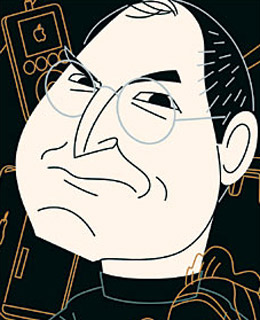
Sometimes Steve Jobs is wrong. When he launched Apple Computer's iTunes Music Store in April 2003, for instance, he predicted it would sell 100 million songs within a year. As of last month, a little more than 50 million 99 cent songs had been downloaded. Sometimes wrong is right enough, though. "I'm thrilled," he says. "It's been a great year." For a man whose marketing prowess is almost as brilliant as his imprint on the computer age, "great" is an understatement. His iTunes-to-iPod music strategy suggests a way to save the free-falling, Napster-knackered music industry. Pixar, his computer-animation studio, won another Academy Award this year, for Finding Nemo. But Jobs' major coup has been his reinvention of the venerable Apple Computer.
Nearly half the MP3 players out there are Apple iPods, more than 2.5 million have been sold so far, and iTunes controls 70% of the music-download business. "I think you're seeing for the first time what Apple's innovation and engineering and marketing can do when we don't have—" Jobs says, pausing for a beat, "that operating-system feeling."
Ah, that. Apple's "operating-system feeling" is a delicate way to refer to the firm's long decline in market share. Fewer than 3% of the world's computer users now have a Mac. The true significance of Jobs' music play was that it allowed the company to get away from the computer wars and find new markets.
In Silicon Valley, being wrong is a common side effect of being innovative. Jobs has been synonymous with the kind of ingenuity that's at the forefront of the tech industry. Everything his company does is scrutinized, often imitated and sometimes even stolen by competitors. (Windows is the most notable example of the highest form of flattery; Wal-Mart's launch of a download-music site is the most recent.) The mouse, how your computer's desktop acts when you point and click at folders and files, wireless Net connectivity, flat-panel displays and DVD burners—these are just some of the things that Jobs was the first to get right for a mass market. He baked them into his Macs, which forced the PC world to follow along. What's next? Jobs will say only, "What drives us is delighting customers." He's definitely right about that.
Quittner is the editor of Business 2.0